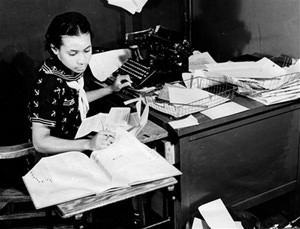Remembering Almena Lomax
Almena Lomax was a crusading journalist, one of many reporters and editors who toiled away on African-American newspapers—the Negro Leagues of journalism—exposing the racism ignored by the white papers that refused to hire them.Almena Lomax was a crusading journalist, one of many reporters and editors who toiled away on African-American newspapers.
Almena Lomax was a crusading journalist, one of many reporters and editors who toiled away on African-American newspapers—the Negro Leagues of journalism—exposing the racism ignored by the white papers that refused to hire them.
Lomax died in Pasadena last month. She was, as Elaine Woo wrote in her Los Angeles Times obituary, “a leading figure in African-American journalism, known for her sharp opinions and independent spirit.”
Lomax studied journalism at Los Angeles City College but couldn’t get a job at a major daily newspaper. “They were taking them out of there as fast as they learned who, what, when, where and how,” but “nobody would hire me,” she said in an oral history recorded for Cal State Fullerton in 1967.
She was founder and editor of the Los Angeles Tribune, a weekly black newspaper. From 1941 to 1961 she fought the evils of her segregated city with words that should have won her a place on a metropolitan newspaper. But the news industry was as segregated as pre-Jackie-Robinson baseball, and scores of talented African-American journalists were turned down by the mainstream papers where they belonged.
Lomax got her chance in the 1960s as a copy editor on the San Francisco Chronicle and as a reporter for the San Francisco Examiner, where she covered the kidnapping of Patty Hearst. She also covered the hunt for Angela Davis, the African-American militant leftist intellectual, who was accused of helping with a violent prison breakout but was acquitted of the charges.
Lomax’s daughter, the late Melanie Lomax, an influential civil rights lawyer and Los Angeles police commissioner, told me that her mother had joined the San Francisco papers after she, by then in her 50s, had passed her prime.
It was like Satchel Paige, she said.
The analogy was perfect. Paige was the greatest pitcher in the Negro Leagues, perhaps in all of baseball. But he didn’t make the major leagues until the Cleveland Indians signed him when he was in his 40s.
I used to talk with Almena Lomax on the telephone while I was with the Los Angeles Times. Our first conversation was unpleasant. She berated me for my coverage of Tom Bradley, the African-American mayor of Los Angeles. She said I was jealous of Bradley’s abilities and I was prejudiced against all black people. A day or two later, Melanie Lomax phoned. She said she had heard her mother had called. Yes, she did, I said. Melanie told me a bit about her mother and her difficult career, limited by bigotry.
Later, Almena Lomax called me again. Our conversation was pleasant and interesting. We talked about the city and politics. She told me about the old days in the Los Angeles African-American community when she and her husband, Lucius Lomax Jr., began the Tribune. She talked about Central Avenue, the heart of the black community. With still a touch of wonder in her voice, she told me how she, a young woman working on the newspaper late at night, was watched over and protected by the elegantly dressed men with their Cadillacs and Lincolns parked in front of the avenue’s legendary clubs. She was such a good storyteller it was easy to visualize the scene. We talked on the phone a few more times and then, through my neglect, the conversations stopped.
They remained in my mind, however, and years later I had a chance to explore the history of that time while writing a biography of a famous post-World-War-II liberal politician, Jesse M. Unruh. He was white, but his politics were inextricably tied to the black community, part of his constituency.
I was interested in the day-to-day racist practices in Los Angeles and other non-Southern cities. The South’s story was well known — but not that of the cities north and west of the Mason-Dixon Line, where segregation was enforced not by Jim Crow laws but by custom and real estate practices. To get the story of the resistance African-Americans encountered as they moved out of the segregated Central Avenue area, I dug into the African-American newspapers. These papers and journalists like Almena Lomax and Charlotta Bass of the California Eagle told this story.
Lomax’s obituary, picked up by The Associated Press and carried throughout the country, recalled those days. Today, when the current generation of journalists scramble for low-pay or no-pay jobs and face daily insecurity, they should pause for a moment in tribute to those who had it even harder—Almena Lomax, Charlotta Bass and other African-American reporters and editors throughout the country who persevered in the face of unrelenting segregation and racism.
Your support matters…Independent journalism is under threat and overshadowed by heavily funded mainstream media.
You can help level the playing field. Become a member.
Your tax-deductible contribution keeps us digging beneath the headlines to give you thought-provoking, investigative reporting and analysis that unearths what's really happening- without compromise.
Give today to support our courageous, independent journalists.






You need to be a supporter to comment.
There are currently no responses to this article.
Be the first to respond.